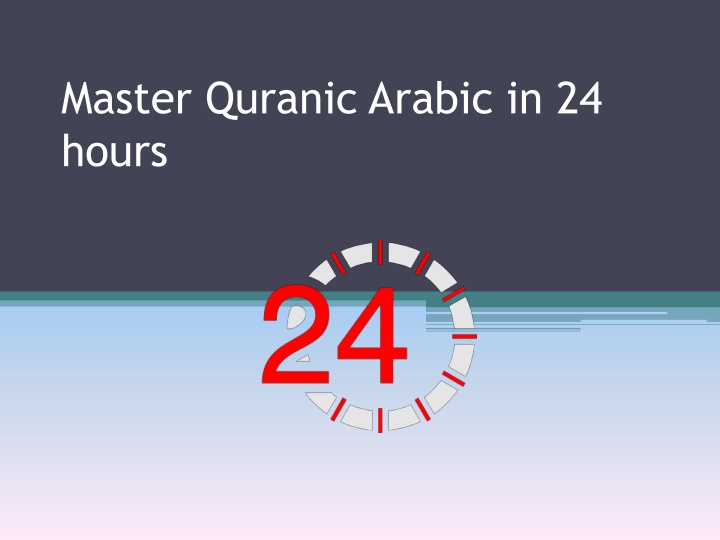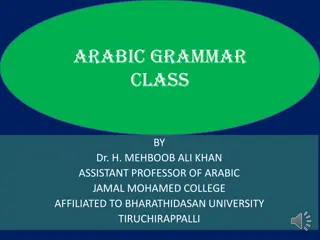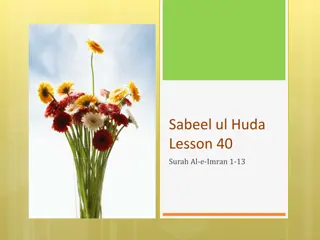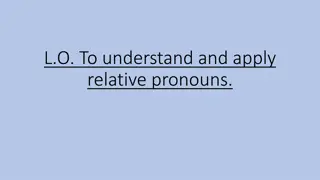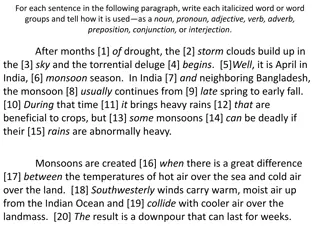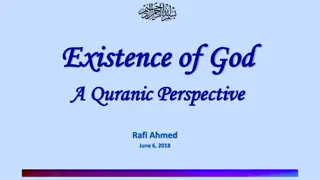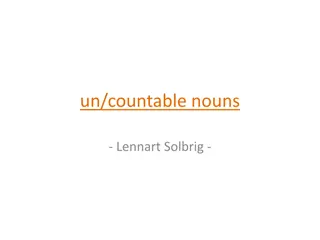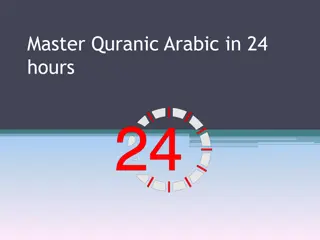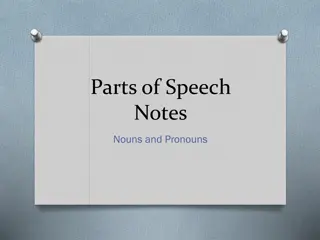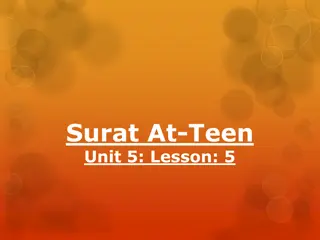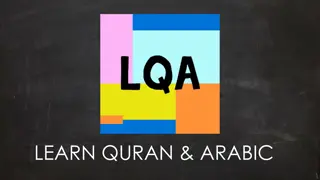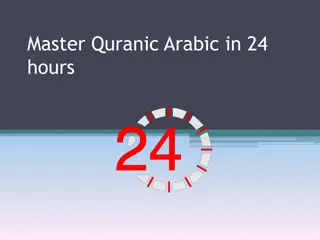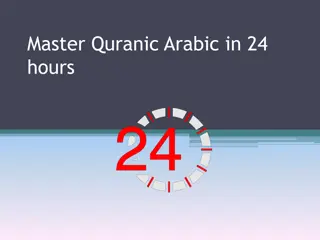Master Quranic Arabic in 24 Hours - Surah Masad and Relative Nouns
Learn Hour 8: Surah Masad and Relative Nouns, including the verses 1-5 from Surah Masad. Understand the meaning and context of this Surah, focusing on the destruction of Abu Lahab. Explore the significance of relative nouns and the importance of attendance in mastering Quranic Arabic.
Download Presentation

Please find below an Image/Link to download the presentation.
The content on the website is provided AS IS for your information and personal use only. It may not be sold, licensed, or shared on other websites without obtaining consent from the author.If you encounter any issues during the download, it is possible that the publisher has removed the file from their server.
You are allowed to download the files provided on this website for personal or commercial use, subject to the condition that they are used lawfully. All files are the property of their respective owners.
The content on the website is provided AS IS for your information and personal use only. It may not be sold, licensed, or shared on other websites without obtaining consent from the author.
E N D
Presentation Transcript
Hour 8 Surah Masad and Relative Nouns
Hour 7 Recap We studied Surah Ikhlas We will ponder over its meanings from next salah Grammar Demonstrative Pronouns Stop on every Ayah and imagine our response from Allah lets make Dua to Allah and lets approach this hour with firm belief that Allah will make it easy for us
Introduction We will learn the verses 1-5 from Surah Masad Grammar: Relative Nouns At the end of this lesson will learn 73words which come in Quran almost 13713 times Attendance is very important
Surah Masad Verse 1-5 Fourth from the bottom Surah of the Quran Revealed in Makkah Talks about the destruction of Abu Lahab (Prophet SAW uncle) and his wife Muhammed SAW called his people on the mountain, and Abu Lahab said to Prophet SAW that may he perish, and Allah revealed this Surah. Do not become the enemy of Allah and his messenger, like Abu Lahab and his wife did. We pray that Allah make us love our religion and keep us on Imaan
Surah Masad Verse 1 and perish he hands Perish (of) the father of flame The two
and perish he hands Perish Perish (of) the father of flame The two Comes from the root word which means perish
and perish he hands Perish (of) the father of flame The two means a hand , means two hands the has been dropped so it becomes The two hands
and perish he hands Perish (of) the father of flame The two Flame Father Abu Lahab was one of the uncles of Prophet Muhammad SAW. And he was called Abu Lahab because of the brightness of his face
and perish he hands Perish (of) the father of flame The two Perish he The first part is a supplication against him and the second is information about him
Message from and perish he (of) the father of flame Perish The two hands Allah destroyed not only Abu Lahab's wicked plans to hurt the Prophet (SAW), but destroyed him as well Are we also being destroyed by Allah by disobeying him
Surah Masad Verse 2 (Will) benefit he earned And what His wealth to him Not
(Will) benefit he earned And what His wealth to him Not This word covered in Hour 6 Not What 2 meanings
(Will) benefit he earned And what His wealth to him Not benefit Comes from the root word which means benefit
(Will) benefit he earned And what His wealth to him Not him With To This word covered in Hour 5
(Will) benefit he earned And what His wealth to him Not his wealth is mentioned 50 times in the Quran In different forms Singular Plural
(Will) benefit he earned And what His wealth to him Not This word covered in Hour 6 what and
(Will) benefit he earned And what His wealth to him Not He Earned In this context it means his children. Neither his wealth nor his children will benefit him.
Message from And what he earned to him Not His wealth (Will) benefit Neither money nor children can benefit a person when he deserves the Hellfire Our wealth and children are a test for us They can be blessing for us or a punishment Don t let Shaytan take us away from Allah with our wealth and children. Let s use our wealth and children to get closer to Allah
Surah Masad Verse 3 flame blazing Soon he will enter (in) a fire
flame blazing Soon he will enter (in) a fire He will enter Soon
flame blazing Soon he will enter (in) a fire Fire Mentioned in the Quran 138 times
flame blazing Soon he will enter (in) a fire Blazing Meaning same e.g right side left side
flame blazing Soon he will enter Flame (in) a fire This word covered in Hour 8
Message from flame blazing (in) a fire Soon he will enter Allah is describing to us how severe is the hell fire Are we asking protection from it? We need to ask Allah to protect us from the hell fire Shaytan is trying his best to fill the hell from jins and humans
Surah Masad Verse 4 wood And his wife (too) (who) carries
wood (who) carries And his wife (too) his wife = means woman = means man In this context it means wife And
wood (who) carries And his wife (too) Carrier = means Carrier = used for female
Message from wood (who) carries And his wife (too) No one can help us on the day of judgment A person will be running away from his brother, his mother and spouse We make our spouse happy and make our Creator upset Do not make the creation happy by making the creator angry
Surah Masad Verse 5 In her neck Of palm fiber (will be) a rope
In her neck Of palm fiber (will be) a rope In her neck means neck
In her neck Of palm fiber (will be) a rope of Palm fiber means fiber It also refers to rope made from fibers or palm leaves
Message from Of palm fiber In her neck (will be) a rope She would help her husband (Abu Lahab) in troubling Prophet SAW In this world they would support each other but in the hell fire no one will be able to help each other
Lets Practice and perish he hands Perish (of) the father of flame The two
Lets Practice he earned (Will) benefit His wealth to him Not And what
Lets Practice flame blazing Soon he will enter (in) a fire
Lets Practice wood And his wife (too) (who) carries
Lets Practice Of palm fiber In her neck (will be) a rope
Phew Alhumdulillah We have completed Surah Ikhlas and Surah Masad, Without Allah s help it would not have been possible, so lets say Alhumdulillah. Let s start to ponder over what we have learnt so far in our Salah, and lets increase our knowledge of Tawheed and improve our obedience to Allah.
NEAR Demonstrative Pronouns Translation Gender / Number Arabic (M/Singular) This (F/Singular) (M/Dual) These two (F/Dual) (M+F/Plural) These all
